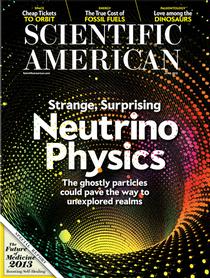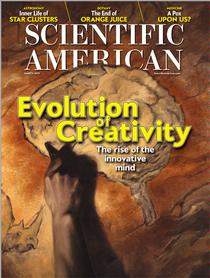How data can help clarify the gun-control debate
According to the Centers for Disease Control and Prevention, 31,672 people died by guns in 2010 (the most recent year for which U.S. figures are available), a staggering number that is orders of magnitude higher than that of comparable Western democracies. What can we do about it? National Rifle Association executive vice president Wayne LaPierre believes he knows: “The only thing that stops a bad guy with a gun is a good guy with a gun.” If La Pierre means professionally trained police and military who routinely practice shooting at ranges, this observation would at least be partially true. If he means armed private citizens with little to no training, he could not be more wrong.
Consider a 1998 study in the Journal of Trauma and Acute Care Surgery that found that “every time a gun in the home was used in a self-defense or legally justifiable shooting, there were four unintentional shootings, seven criminal assaults or homicides, and 11 attempted or completed suicides.” Pistol owners’ fantasy of blowing away home-invading bad guys or street toughs holding up liquor stores is a myth debunked by the data showing that a gun is 22 times more likely to be used in a criminal assault, an accidental death or injury, a suicide attempt or a homicide than it is for selfdefense. I harbored this belief for the 20 years I owned a Ruger .357 Magnum with hollow-point bullets designed to shred the body of anyone who dared to break into my home, but when I learned about these statistics, I got rid of the gun. (continue reading…)
read or write comments (70)
Did a neurosurgeon go to heaven?
In Eben Alexander’s best-selling book Proof of Heaven: A Neurosurgeon’s Journey into the Afterlife (Simon & Schuster), he recounts his near-death experience (NDE) during a meningitis-induced coma. When I first read that Alexander’s heaven includes “a beautiful girl with high cheekbones and deep blue eyes” who offered him unconditional love, I thought, “Yeah, sure, dude. I’ve had that fantasy, too.” Yet when I met him on the set of Larry King’s new streaming-live talk show on Hulu, I realized that he genuinely believes he went to heaven. Did he?
Not likely. First, Alexander claims that his “cortex was completely shut down” and that his “near-death experience … took place not while [his] cortex was malfunctioning, but while it was simply off.” In King’s green room, I asked him how, if his brain was really nonfunctional, he could have any memory of these experiences, given that memories are a product of neural activity? He responded that he believes the mind can exist separately from the brain. How, where, I inquired? That we don’t yet know, he rejoined. The fact that mind and consciousness are not fully explained by natural forces, however, is not proof of the supernatural. In any case, there is a reason they are called near-death experiences: the people who have them are not actually dead. (continue reading…)
read or write comments (56)
Pluralistic ignorance and the last best hope
on earth
In Tyler Hamilton’s 2012 book The Secret Race (written with Daniel Coyle), the cyclist exposes the most sophisticated doping program in the history of sports, orchestrated by Lance Armstrong, the seven-time Tour de France winner now stripped of his titles after a thorough investigation by the U.S. Anti-Doping Agency. Hamilton shows how such an elaborate system was maintained through the “omertà rule”—the code of silence that leads one to believe everyone else believes doping is the norm—and reinforced by the threat of punishment for speaking out or not complying.
The broader psychological principle at work here is “pluralistic ignorance,” in which individual members of a group do not believe something but mistakenly believe everyone else in the group believes it. When no one speaks up, it produces a “spiral of silence” that can lead to everything from binge drinking and hooking up to witch hunts and deadly ideologies. A 1998 study by Christine M. Schroeder and Deborah A. Prentice, for example, found that “the majority of students believe that their peers are uniformly more comfortable with campus alcohol practices than they are.” Another study in 1993 by Prentice and Dale T. Miller found a gender difference in drinking attitudes in which “male students shifted their attitudes over time in the direction of what they mistakenly believed to be the norm, whereas female students showed no such attitude change.” Women, however, were not immune to pluralistic ignorance when it comes to hooking up, as shown in a 2003 study by Tracy A. Lambert and her colleagues, who found “both women and men rated their peers as being more comfortable engaging in these behaviors than they rated themselves.” (continue reading…)
Comments Off on Dictators and Diehards
In this year’s annual Edge.org question “What should we be worried about?” I answered that we should be worried about “ The Is-Ought Fallacy of Science and Morality.” I wrote: “We should be worried that scientists have given up the search for determining right and wrong and which values lead to human flourishing”. Evolutionary biologist and philosopher of science Massimo Pigliucci penned a thoughtful response, which I appreciate given his dual training in science and philosophy, including and especially evolutionary theory, a perspective that I share. But he felt that my scientific approach added nothing new to the philosophy of morality, so let me see if I can restate my argument for a scientific foundation of moral principles with new definitions and examples.
First, morality is derived from the Latin moralitas, or “manner, character, and proper behavior.” Morality has to do with how you act toward others. So I begin with a Principle of Moral Good:
Always act with someone else’s moral good in mind, and never act in a way that it leads to someone else’s moral loss (through force or fraud).
You can, of course, act in a way that has no effect on anyone else, and in this case morality isn’t involved. But given the choice between acting in a way that increases someone else’s moral good or not, it is more moral to do so than not. I added the parenthetical note “through force or fraud” to clarify intent instead of, say, neglect or acting out of ignorance. Morality involves conscious choice, and the choice to act in a manner that increases someone else’s moral good, then, is a moral act, and its opposite is an immoral act. (continue reading…)
Comments Off on Towards a Science of Morality: A Reply to Massimo Pigliucci
How politics distorts science
on both ends of the spectrum
Believe it or not—and I suspect most readers will not—there’s a liberal war on science. Say what?
We are well aware of the Republican war on science from the eponymous 2006 book (Basic Books) by Chris Mooney, and I have castigated conservatives myself in my 2006 book Why Darwin Matters (Holt) for their erroneous belief that the theory of evolution leads to a breakdown of morality. A 2012 Gallup Poll found that “58% of Republicans believe that God created humans in their present form within the last 10,000 years,” compared with 41 percent of Democrats. A 2011 survey by the Public Religion Research Institute found that 81 percent of Democrats but only 49 percent of Republicans believe that Earth is getting warmer. Many conservatives seem to grant early-stage embryos a moral standing that is higher than that of adults suffering from debilitating diseases potentially curable through stem cells. And most recently, Missouri Republican senatorial candidate Todd Akin gaffed on the ability of women’s bodies to avoid pregnancy in the event of a “legitimate rape.” It gets worse. (continue reading…)
read or write comments (14)





